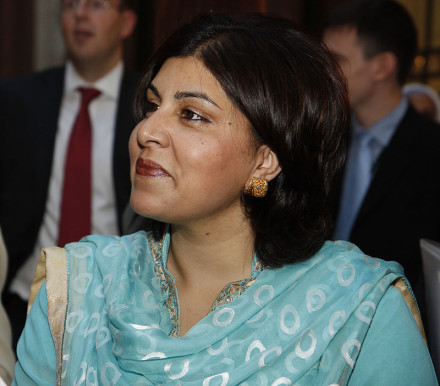Alec Shelbrooke, the Conservative member of parliament for the West Yorkshire seat of Elmet and Rothwell – majority over Labour 4,521 – was on characteristically blunt form yesterday. “I think within a week ‘Who was Lady Warsi?’ will be the question. She has ended her career in many ways,” he said.

I think people will be talking about Sayeeda Warsi long after they have forgotten about some of the one-term-only Conservative MPs who, like Mr Shelbrooke, were elected to parliament in May 2010. Leave that to one side. If you were trying to respond to the question “Who was Lady Warsi?” what answer might you come up with? Here is my attempt.
Baroness Warsi was the person who understood as well as anyone what the Conservative party had to do to broaden its appeal to voters. She recognised that the Tory front bench did not seem to reflect the interests of the majority of people in this country. She saw that many felt either ignored or patronised by what they heard from leading Conservative party figures.
Baroness Warsi was a working class second generation British Pakistani woman, who became a successful lawyer, building a political career and winning promotion on merit. She feels that she had to work “10 times as hard as anyone” to achieve what she did, as she told the Independent on Sunday yesterday.
Baroness Warsi was Yorkshire born and bred – she is from Dewsbury near Leeds – and the family home is in Wakefield. She was a northerner. She spoke, often courageously, in plain terms. She made a striking and refreshing change from the majority of other senior Tory figures, being both down-to-earth and aware that there is a world outside London.
Baroness Warsi was someone who understood the particular challenge facing the Conservative party as far as black and minority ethnic (BME) voters are concerned. Of course, there are many different ethnic groupings in the UK, not one single bloc. Societies develop and change. And, as the Labour party found out in Bradford West, nothing should be taken for granted about any given community. But Baroness Warsi understood this too. That is why she was keen to try and shift her colleagues on the broader issue of BME voters. At the last election the Tories won over 36% of the vote, but had support from only 16% of BME voters. According to some estimates, by 2050 a third of the UK population will be BME.
It is said that the Tory strategist Lynton Crosby is relaxed on this issue, pointing to data which suggest that BME voters will not be decisive in vital battleground seats. But Baroness Warsi understood the broader point. In 2010 the Conservatives were able to attract voters who believed that the party had changed – that there was, in fact, a more modern and open Tory party that welcomed diversity. But the bad-mouthing and denigration of the former foreign office minister give the lie to that. It is not just BME voters, in other words, who may be put off by her departure. Some of those who bought into the “Compassionate Dave” story may put off too.
(I am forced to wonder, not for the first time, if Lynton Crosby isn’t in fact pursuing a scorched earth election strategy for the Conservatives, making future victories even harder to achieve? Lord Finkelstein – “The issue that Ukip raises is almost exactly the opposite of the one the Conservative Party needs to answer. Our problems are: we don’t have enough young people, we don’t have enough ethnic minorities, we do not have enough people in prosperous rising cities.” – might be wondering too.)
Who was Lady Warsi? She was another confident, forceful woman who has been told off, by men, for being “pushy” and “bossy”. (Labour’s Baroness, Shriti Vadera, may know what this feels like.) All the usual sour criticisms have emerged: “not a team player”, “over-promoted”, “incompetent”, “a disaster”. It has even been suggested that her resignation over the government’s position on Gaza was not sincere. It is a pretty tasteless and, I think, unfounded allegation.
Conservative Home’s Mark Wallace was probably right to say, as he did a few days ago, that Baroness Warsi’s appointment (to her foreign office post at least) will have been seen by some as “a generalised, tokenistic fix based on personalities rather than ideas”. But it cannot have been simply the Baroness’ fault alone if her opinions and advice have not been heeded.
So Alec Shelbrooke was wrong to suggest that a dismissive “Who was Lady Warsi?” will be the question on the lips of Westminster folk or ordinary voters in the days to come. But the short answer to that question is that she was a canary in the coalmine of Tory troubles. And the warnings have been ignored.
* This column will return on Monday 1st September.
Stefan Stern is Contributing Editor of LabourList




More from LabourList
Turning the page? Labour’s recovery in the polls show a path to 2029 victory
Restoration announce recommendations for NEC candidates
‘Factionalism at the top is weakening Labour – and handing a gift to Reform’